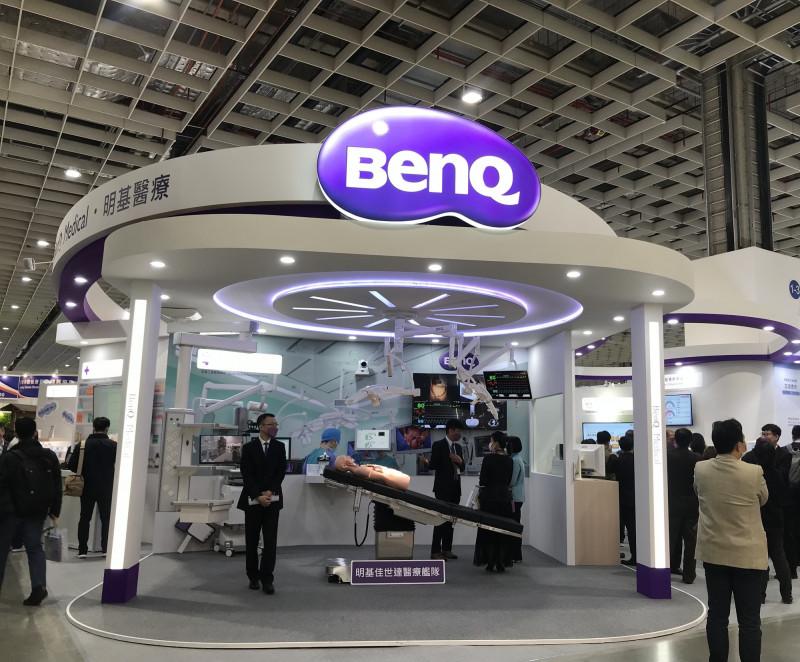BenQ BM Holding Cayman Corp (BBHC, 明基醫院集團) plans to list its shares in Hong Kong, its parent company Qisda Corp (佳世達) said on Thursday, as it aims to expand the group’s medical service business and grow its revenue and profits.
Qisda’s board of directors on Thursday green-lighted BBHC’s initial public offering (IPO) proposal for the Hong Kong stock exchange’s main board, which is subject to shareholder and regulatory approval. An extraordinary shareholders’ meeting is to take place on March 14, the company said in a statement, without disclosing how much it is seeking to raise from the IPO.
The company’s medical operations have seen stable growth in recent years thanks to sales contributions from hospitals and its medical supply business, with product lines including dialyzers, ultrasound equipment and medical consumables.

Photo: Chen Mei-ying, Taipei Times
BBHC is the largest business unit among Qisda’s medical operations compared with a dozen of other units, the company said.
In China, BBHC operates Nanjing BenQ Medical Center (南京明基醫院) and Suzhou BenQ Medical Center (蘇州明基醫院) in Jiangsu Province, and invests in Guigang Donghui Hospital (貴港東暉醫院) in Guangxi Province, it said.
“With the Hong Kong listing, BBHC can raise funds through multiple channels to strengthen its working capital and optimize its financial structure,” Qisda said. “This will help it further expand the scale of hospitals, increase the number of beds, and introduce special medical teams and equipment, among others.”
FINANCIAL HEALTH
The IPO is expected to increase BBHC’s industry visibility and attract more talent, Qisda said.
It is also conducive to enhancing the group’s financial health and the interests of shareholders, it said.
Qisda, whose business operations includes information technology and medical services, smart business solutions and networking and communications applications, reported that its consolidated revenue last year fell 15 percent year-on-year to NT$203.9 billion (US$6.485 billion).

Taiwan Semiconductor Manufacturing Co (TSMC, 台積電) would not produce its most advanced technologies in the US next year, Minister of Economic Affairs J.W. Kuo (郭智輝) said yesterday. Kuo made the comment during an appearance at the legislature, hours after the chipmaker announced that it would invest an additional US$100 billion to expand its manufacturing operations in the US. Asked by Taiwan People’s Party Legislator-at-large Chang Chi-kai (張啟楷) if TSMC would allow its most advanced technologies, the yet-to-be-released 2-nanometer and 1.6-nanometer processes, to go to the US in the near term, Kuo denied it. TSMC recently opened its first US factory, which produces 4-nanometer

GREAT SUCCESS: Republican Senator Todd Young expressed surprise at Trump’s comments and said he expects the administration to keep the program running US lawmakers who helped secure billions of dollars in subsidies for domestic semiconductor manufacturing rejected US President Donald Trump’s call to revoke the 2022 CHIPS and Science Act, signaling that any repeal effort in the US Congress would fall short. US Senate Minority Leader Chuck Schumer, who negotiated the law, on Wednesday said that Trump’s demand would fail, while a top Republican proponent, US Senator Todd Young, expressed surprise at the president’s comments and said he expects the administration to keep the program running. The CHIPS Act is “essential for America leading the world in tech, leading the world in AI [artificial

REACTIONS: While most analysts were positive about TSMC’s investment, one said the US expansion could disrupt the company’s supply-demand balance Taiwan Semiconductor Manufacturing Co’s (TSMC, 台積電) new US$100 billion investment in the US would exert a positive effect on the chipmaker’s revenue in the medium term on the back of booming artificial intelligence (AI) chip demand from US chip designers, an International Data Corp (IDC) analyst said yesterday. “This is good for TSMC in terms of business expansion, as its major clients for advanced chips are US chip designers,” IDC senior semiconductor research manager Galen Zeng (曾冠瑋) said by telephone yesterday. “Besides, those US companies all consider supply chain resilience a business imperative,” Zeng said. That meant local supply would

BIG INVESTMENT: Hon Hai is building the world’s largest assembly plant for servers based on Nvidia Corp’s state-of-the-art AI chips, Jalisco Governor Pablo Lemus said The construction of Hon Hai Precision Industry Co’s (鴻海精密) massive artificial intelligence (AI) server plant near Guadalajara, Mexico, would be completed in a year despite the threat of new tariffs from US President Donald Trump, Jalisco Governor Pablo Lemus said. Hon Hai, also known as Foxconn Technology Group (富士康科技集團), is investing about US$900 million in what would become the world’s largest assembly plant for servers based on Nvidia Corp’s state-of-the-art GB200 AI chips, Lemus said. The project consists of two phases: the expansion of an existing Hon Hai facility in the municipality of El Salto, and the construction of a